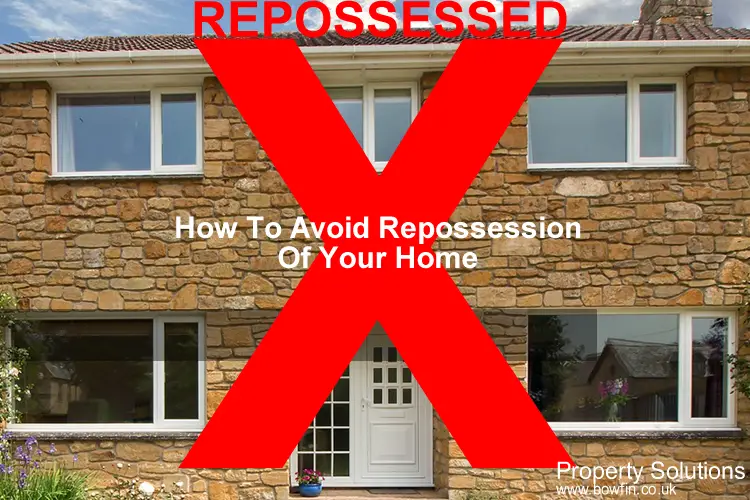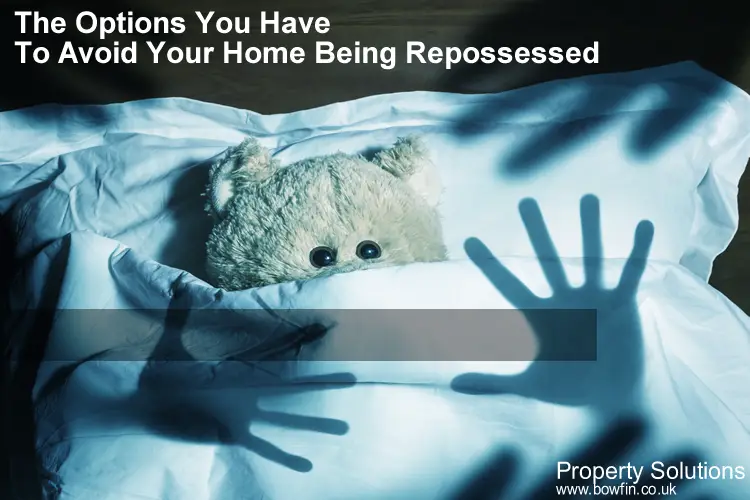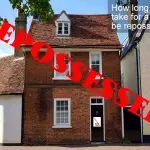
Having mortgage arrears isn’t a good place to be. Having the bank breathing down your neck with a repossession order pending is a scary place to find yourself.
Always remember, banks don’t want to repossess your home. They would prefer to resolve the matter. This could be with you if you are able, or with the help of a third party like ourselves.
How to avoid repossession of your home:
- Don’t bury your head in the sand and take action.
- Seek expert advice and speak to someone who can help: E.g. Citizen’s Advice, Shelter or Step Change.
- Talk to your lender and don’t ignore their letters or phone calls.
- Try to improve your financial situation.
- Negotiate a repayment plan with your lender.
Options to avoid repossession of your home
There are a few options open to you if you are facing the repossession of your home.
The first of these is to not stick your head in the sand! But if you are the type that does stick their head in the sand, you first need to pull it out of the sand.
Are you are afraid to open your mail?
Do you have piles of post building up that you are simply too scared to open?
You are not alone. Many people are just like you. It’s a scary place to be.
It’s a bit like being a rabbit in the headlights.
If you are frozen not knowing which way to turn, this normal and a very common reaction.
But there’s one sure thing about bank repossessions…which is if you ignore the bank, if you don’t do something about the problem, your home will be repossessed.
More Reading: Can I get my home back after repossession (What would it take?)
Here’s the good news…
The good news is you are reading this article. This could be your first step in the right direction to get the help you need. But don’t just read this article and then not take action.
Either contact us or seek help from an adviser.
The options you have to avoid your home being repossessed

Here are a few options for you to consider if you find yourself in arrears and staring down the repossession gun barrel…
Act immediately
Act now. Don’t stick your head in the sand. Or if your head is in the sand, pull it out and take action. The longer you leave it, the worse it will be. Otherwise the only sure thing is by doing nothing, your home will be repossessed
The first advice you need to follow is to act quickly. If your home hasn’t yet been repossessed, there’s still the option to speak with the mortgage company. The longer you leave it, the worse it gets.
Each month that goes by, the more mortgage arrears that will build up. Also, the longer you leave it, the closer you are to being evicted from your own home by the bank or mortgage company.
The last thing you want to is to be kicked out and be on the street. Especially if you have children.
Taking action and act now. By acting before repossession proceedings commence, this will at least give you some control over what happens next.
How many months in arrears you are right now, will impact how much time before you are repossessed. So time is of the essence.
Seek expert advice
You need to find someone to speak to.
There’s help and support on home repossessions in the UK on Shelter. Here you’ll be able to find information about legal advice about going to court. They also explain about legal aid and when this may be available too.
Depending on your situation, you may be able to get legal aid for possession proceedings for mortgage arrears. You may also be able to seek aid for court proceedings for an order to sell your home or with bankruptcy proceedings.
But as I’ve already explained, Shelter also emphasise the importance of ‘the sooner the better.’ Get help now and don’t delay.
If you seek help today, you may not have your home repossessed.
Speak to your lender
If you’ve not already done so, speak with your lender. Every lender in the UK must follow pre-action protocol rules. These rules include the lender’s duties before court action.
Before your lender takes steps to repossess your home, they must try to discuss your finances with you. They must also give you a reasonable chance to pay the arrears.
Examples of what they must let you know:
- The total amount of the arrears.
- Your monthly installments.
- How much is left to pay on the mortgage.
- The payments you’ve made over the last two years.
- The interest charges that will be added.
Pay something towards your arrears
If you are able to it’s never too late to pay an amount towards your arrears.
Even if these are only small amounts, as they help to rebuild the trust with your lender. They show the mortgage company that your are making an effort.
This may be enough to keep the bank at bay until such time as you are able to get your finances in order.
Renegotiate your mortgage terms
As already mentioned, it’s not in the lenders interest to repossess you. With this in mind, you may try speaking with your mortgage lender about renegotiating your mortgage terms.
You could ask to extend the mortgage term or change the type of mortgage that you have.
Try negotiating reduced payments or a payment holiday. A payment holiday is where you have a gap where you don’t pay your monthly installments.
You could also try negotiating the capitalisation of the arrears. This would mean that the mortgage company would add what you owe in arrears to the total balance. This changes your arrears to capital owed.
However, usually it’s easier to make changes to your mortgage terms, before you get into arrears. But it’s worth trying.
Seek help with your mortgage payments
If you already claim certain qualifying benefits, you may be able to get help with your mortgage payments.
This is found through Support For Mortgage Interest (SMI). This can take up to 39 weeks before SMI kicks in. You should therefore explain to your bank that you have made the claim.
Seek help from a property solutions company
Your other option if the above fail, is to seek the help from a property solutions company.
There are many companies and individuals out there who can help. This help usually involves the property solutions company taking over the mortgage payments on your behalf. In addition to this, the arrears are also sorted out.
In this instance, we would speak to your bank on your behalf, once the bank has been provided with your permission for us to speak with them on your behalf.
It’s also possible, and subject to the amount of equity you have in your home after taking the mortgage and arrears off, you may be paid-out from the deal too.
If you want to find out how this works, message us on our contact page as soon as you are able to.
Now that I have answered the question of ‘How to avoid repossession of your home,’ here are a few answers to additional question people tend to ask around this subject.
Can the bank repossess my home?
Where you’ve exhausted all options open to you to avoid the repossession, the lender can repossess your home.
The lender is able to do this under the laws of the UK in order to recover the amount you owe, i.e. the mortgage.
If you don’t agree to your home being repossessed, the lender is likely to take you to court.
The reality is that where a bank or mortgage company goes to court for a house repossession, they usually win. They will win if they’ve followed all the relevant procedures in the pre-action protocol.
If your repossession has got to the court stage, this will now also be costing you money on court fees and legal fees. You are therefore better off avoiding this step by taking action sooner.
Assume that if the lender instigates repossession proceedings, your home will be repossessed. If the lender takes you to court this isn’t necessarily the end of the process, but you may have left it too late. You should read this article on home repossession. The laws around repossession are different for mortgages taken out before 1 December 2009.
At this point you may need to find somewhere else to live.
What happens when you have your home repossessed?
Many people wonder what happens after you have your home repossessed by the bank.
When the lender takes your home into possession (i.e. its been repossessed), they have a legal duty to sell the property at the best price that can be reasonably be obtained.
But as we all know repossessed properties never sell for their true market value. Due to the fact that the sale is a ‘forced sale’ and many times at auction, the sale proceeds are generally lower than what would normally be expected to be received, had it been sold in the conventional way.
The proceeds of the sale are then used to clear down the loan or mortgage, plus any arrears and legal fees and sellers fees. Any surplus will be returned to you by the bank.
However, if the proceeds are not sufficient to clear what’s owed to the mortgage company, so there’s a shortfall, then you will still owe this to the lender. Interest will continue to accrue on the balance owed.
Whether your lender takes action to recover the shortfall will depend on the circumstances. A lender may or may not wish to seek repayment of the shortfall debt. But where they do wish to recover the balance due, they must notify you within six years.
What is a shortfall on a mortgage?
As explained above, a mortgage shortfall occurs when the amount recovered on the sale of a repossessed home is lower than what’s owed.
This happens when the amount your repossessed home is sold for less than the outstanding mortgage, plus any other secured loans. The full amount of the loan will also include any arrears that are outstanding on the loan.
The shortfall will also be affected by legals fees, court costs and agents selling fees. Money you still owe to your mortgage or secured loan lender in this situation, is called a ‘mortgage shortfall’.
How long is a repossession on your credit report?
A repossession will affect your credit score. People often ask how long does a repossession stay on your credit report.
The amount of time repossessions stay on your credit report is seven years according to Experian. The seven years begin to run after the original delinquency date or first miss mortgage payment.
A repossession can negatively impact your credit rating for the duration of the seven years, but that impact lessens over time.
Having said that, if you are applying for credit or other contract outside of this seven year time limit and where this question is asked, you should consider declaring what happened.
However, you may wish to seek independent advice on this point, as there are differing views on whether or not you have to declare spent CCJ’s or repossession orders.
More Reading: I want my house to be repossessed UK (Voluntary repossession UK)
Help is at hand if you are worried about avoiding the repossession of your home
The important thing to note: If you’re worried about how to avoid repossession of your home; Don’t ignore the problem…take action today and contact us here.




